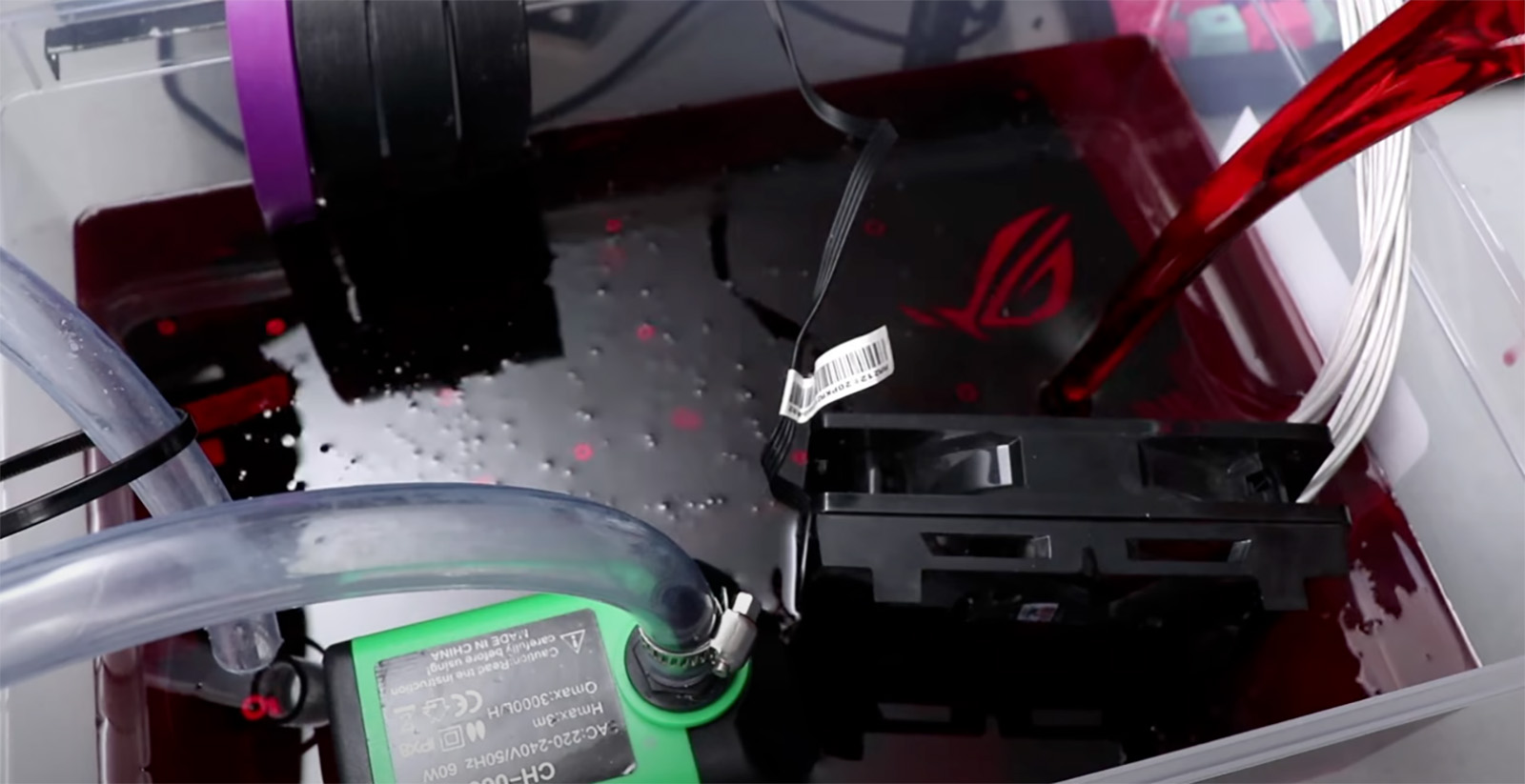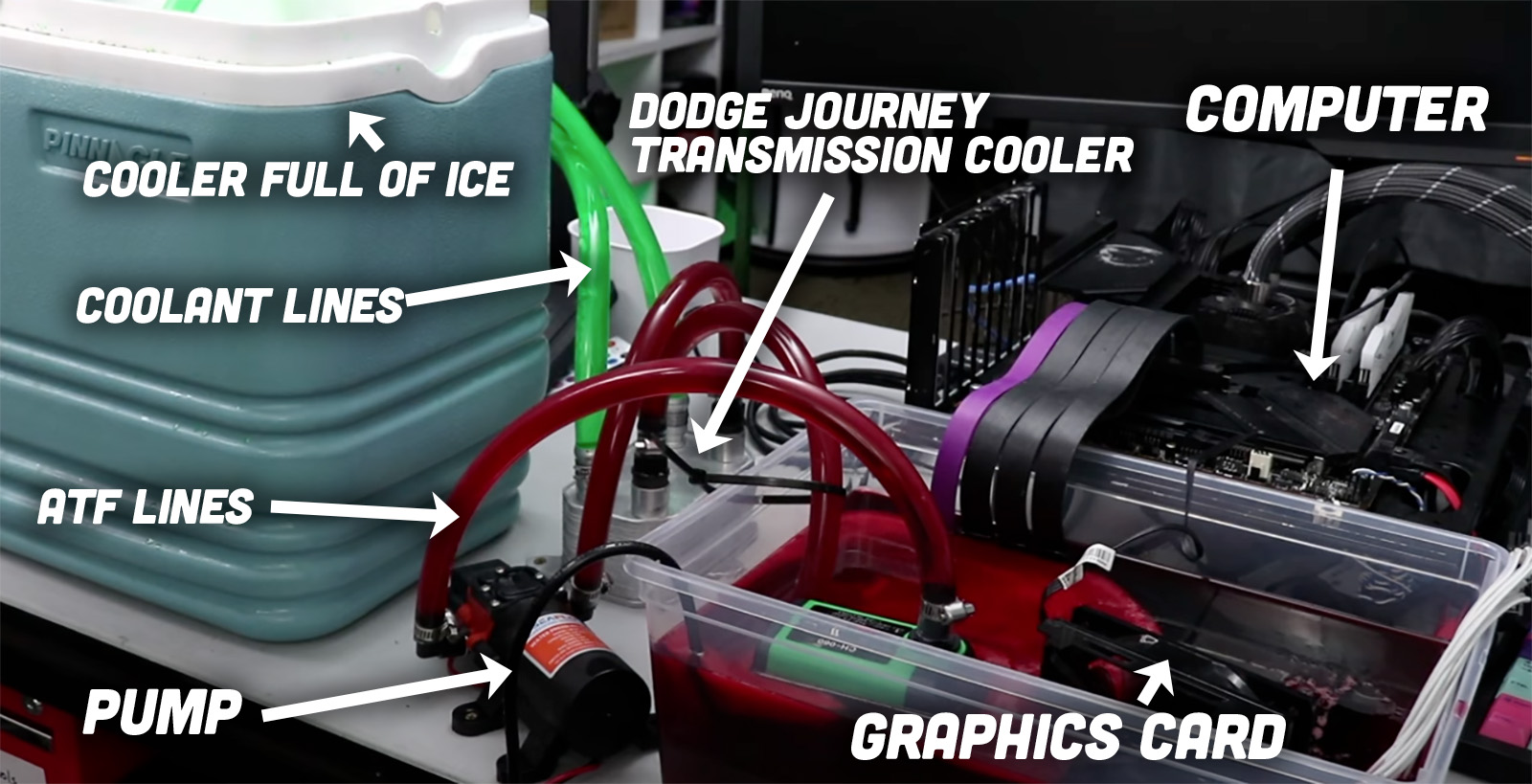Essentially, here’s what’s going on: as you may or may not know, there’s a never ending quest to extract as much performance as possible out of PC graphics cards, I suppose for the purpose of better graphics performance (though I’m not really sure I’d be able to perceive a few frames per second change at anything over 30 FPS) but I think more because there’s some strange part of human nature that loves to push the limits of, well, anything.
The way most avid, daring gamers squeeze more performance out of their graphics cards is via a process known as overclocking, where the speed at which the card’s graphics processing unit (GPU) runs is increased. This speed is measured in megahertz (MHz) or gigahertz (GHz), and measures the numbers of cycles per second, where each cycle is some basic operation. We don’t need to go into it much more than that, save to say that, generally, more means faster. Of course, there’s a bit of a catch, which is that the higher you clock your chip, the more heat that needs to be dissipated.
And that fundamental fact of thermodynamics is what led to this experiment by a gaming/tech YouTuber named TrashBench that involved a Dodge Journey transmission cooler, a graphics card, and eight liters of automatic transmission fluid:
It’s a pretty successful experiment overall, as he manages to increase the speeds of both a GeForce GTX 1080 Ti card by about 8%, which is modest, but these things are already pushed to their limits from the factory. When he tried it on another card, a GeForce GTX 1060, the overclocking percentage was about 16%, and it seems to now be the world’s fastest running instance of such a card, because people keep track of these sorts of things, it seems.
I’ll be honest: I don’t know a hell of a lot of this world, because the miserable old computers I tend to focus most of my attention on run between 1 and, like 4 MHz, and while some may have a video chip, separate graphics cards are rare. But that’s not to say I don’t appreciate the cleverness of what is going on here, because I definitely do, especially because of how it works in automotive parts.
It’s in the need to remove heat that automotive technologies and computer technologies perhaps can find the most synergy; cars have been developing systems to shed lots and lots of heat for well over a century, and there’s no reason those methods can’t be successfully used in the computer world! Well, maybe one reason: messiness.

I think that’s why our man here looks so nonplussed; while this approach netted him a world-class graphics card speed victory, it’s sort of a pyrrhic victory, at least if you’re someone who doesn’t like gooey vivid red liquid all over everything in your home. Here’s what TrashBench had to say about it on his Reddit post describing the experiment:
Also, ATF is fun. It crawls into every crevice, stains your cables, and turns teardown into a full day regret spiral. Don’t try this unless you’re okay with ruining hardware and your mood.
I’m sure most of our usual readers are familiar with ATF, which looks and flows something like a cross between blood and IHOP’s boysenberry pancake syrup, and is quite difficult to clean off things.

ATF is messy, sure, but it’s also non-conductive, which makes it ideal for submerging electronic components into. To take advantage of the Dodge transmission cooler, TrashBench needed to make a system that sort of emulated the setup in a car, where the ATF is exposed to coolant, which the heat is transferred to, and then that coolant goes into the radiator to be cooled by airflow. Unlike some transmission coolers that are essentially small radiators on their own and must be positioned in some manner of airflow, the Journey’s transmission cooler uses two separate loops of fluid inside, which never mix: one for coolant, one for ATF, and the coolant gets cooled down by the radiator.
Lacking moving air or a radiator or any automotive-scale fans, an alternate configuration had to be made, utilizing a big cooler full of ice:

So, as you can see here, the green fluid is coolant, which is pulling heat out of the ATF inside the transmission cooler, and the cooler of ice is standing in for the radiator, cooling it all down. An external pump is keeping everything moving, and the card itself is just submerged in the scarlet fluid, with its fans removed but heat sinks remaining, which give lots of surface area for the ATF to pull heat from.
This isn’t really a practical solution, but you know what? It works, and probably could be made a bit neater, if one absolutely had to have the fastest graphics performance possible, and on a pretty reasonable budget. I wonder how well a version of this could work with an actual radiator/fan instead of the cooler of ice? I feel like the old car cooling system parts/overclocking world of experimentation is really just getting started!
Top Photo: TrashBench/ Dodge









Just a random reminder not to chainsaw a battery otherwise you will…megahertz
I’ll see myself out…
Might be viable for all those data centers being built, but what happens after the AI bust?
Cheap rack-mount servers for the masses!
Suppose it could have been worse, he could have used brake fluid.
Finally we have a place to dispose of all those Dodge Journeys.
I just like that this could have been something Torch totally made up, and yet it’s 1000% true.
I once took a bath in ATF while changing the filter in a past car. I did my damndest to make sure it would drain into the pan, but instead it decided to drain on me. I got hosed off outside the shop before I attempted the drive home later. It is not something I have any desire to experience again.
Sounds more like a shower, but still sorry that happened to you.
Doing immersion cooling with transmission fluid seems like a bad idea for graphics card longitivity. At a previous job we used pure mineral oil for pressure balanced oil filled assemblies for deep sea applications and many common plastics and wire insulators ended up swelling and degrading over time. I’m sure there are plenty of board components and insulators that will absolutely fail given the detergent/additive package in ATF, much less the base oil.
On another note, he’s not getting great flow over the radiator fins in this setup. Ideally you’d want a jet of cold oil aimed directly at the graphics card heat exchanger, instead of just discharging vaguely into the bin. He needs either a dedicated fluid cooled heat exchanger block that bolts directly to the graphics chip or to put a lot more thought into flow patterns to maximize cold flow over the fins.
Any reason you used mineral oil instead of fluorinert?
Didn’t need the specialized properties of Fluorinert, and mineral oil is far cheaper.
Maybe you did?
Ha! Fair enough. We ended up solving the problem with an approved list of materials that got us the functionality we needed in oil without the expense of Fluorinert. The point though is that you can’t just throw electronics into an oil bath and expect them to work long term, there has to be testing and qualification first.
Why not do this sort of thing with refrigerant and get into the wizardry of latent heat? It should be possible to cannibalize/reconfigure a dorm fridge so that you have an evaporator of sorts on the cpu. Refrigerants absorb a LOT of heat when they change from liquid to vapor phase!
You just said the two magic words that will conjure up Alec from Technology Connections. Those words are “latent heat”.
Just about every air-cooled CPU and GPU heatsink uses heat pipes to take advantage of the phase change stuff.
https://www.xometry.com/resources/3d-printing/what-is-heat-pipe/
It is amusing that we differentiate PC “watercooling” (tubes full of water carrying heat to a radiator and fans) and “air cooling” (tubes full of water carrying heat to a radiator and fans) these days.
There’s a long history of car parts and overclocking. Back in my day……you couldn’t just buy a self contained water cooled system for your computer. First you had to machine a cooler or glue a heatsink to the square bit of a big PVC pipe cap. Then all sorts of hose fittings connected usually to a heater core or transmission cooler. I think I recall some people even using washer fluid pumps for the systems. Sometimes you added in some peltier units if your were really getting wild. All this for what, 30 or 40 watts compared to todays GPUs pumping 5+ times that.
I went a solid decade without building a new computer, and when I went to get parts for a new one I was shocked to find that not only are all-in-one water coolers common, they’re actually all-but-required for high end CPUs these days. Finally had to retire the Thermalright cooler I’d been using forever.
Should have just got a traditional transmission cooler and dunked it directly in the cooler full of ice water.
I just came here to say this. Not sure why I was still thinking about it.
I guess for the most simplicity he could replace the plastic storage box with a finned aluminum one and float that directly in the cooler. I guess fewer moving parts is less sexy, though.
Back in the early days of watercooling (24 years ago) we actually went to junkyards to get trans coolers to use as watercooling radiators because specialty parts just didn’t exist. We used pond pumps that you plugged into the wall out of the back of the pc. The good ole days.
Just posted something similar. I remember using heater cores for radiators. Or just long copper tubes, sometimes in ice water just to get stable long enough for a benchmark.
Yeah I miss those days sometimes. I feel like an old man when I look at people’s modern watercooling and I am not impressed because you just bought stuff and put it together like legos. We actually had to be creative to figure out how to get it to work.
Yeah, it’s weird this stuff is popping up again. My first (and only) watercooling setup in the early 2000’s used a Ford Taurus heater core, custom (cardboard) fan shroud and an aquarium pump. Didn’t really bother with it again because it’s just a PITA. I may still have that water block around somewhere..
Totally a pain in the ass. I remember dragging my rig to a lan party with it and it weighed like 100 pounds haha.
“I’m sure most of our usual readers are familiar with ATF, which looks and flows something like a cross between blood and IHOP’s boysenberry pancake syrup, and is quite difficult to clean off things.”
Modern ATF is usually made with petroleum-based ingredients so there’s that.
ATF of yore used to be made with whale oil as a primary ingredient well into the early 70s (some formulations actually used whale oil as THE primary ingredient.) And people were finding that some ATF additives were still being made with whale oil as late as 1985 & possibly even later, good grief.
Dunno how vintage ATF compares in terms of messiness to modern ATF (as I almost always only had manual transmission cars starting with my first car and my family’s Super Beetle from the late 70s and early 80s on so my experience with ATF is awfully limited) but I can wholeheartedly say that I’d much rather deal with cleaning up IHOP’s boysenberry pancake syrup than whale oil.
ETA: I do recall older mechanics commenting that burnt vintage ATF smelled so much worse than burnt modern ATF…
Child’s play. Someone get this guy a 2 liter of Fluorinert.
Jason I bet you could get your PC up to 4.5 MHz if you did this
This might be the start of the new cooling that AI needs… In September 2025 a 5090 card user tried some of the same concepts. The 5090 became self aware in October 2025 with its extra clock speed, it was just enough. It mobilized leaked code from various AI engines and then replicated to thousands and then millions of computers using a distributed computing method, much like the distributed.net challenge of 1998- AI never forgets… The system had taken over SCADA globally by late December 2025… January 1, 2026 was the launch…
Ok… bravo. And now I will never sleep again. Gonna go off grid.
Funny because I just taped a GeForce GTX 1080 Ti to my Dodge Journey’s transmission and measured an 8% increase in its sad Dodge Journeyness!
Imagine the gains if you’d used a Fuel Shark!
I love PC Gaming and I love cars. A car themed PC case is cool, but using ATF for cooling is just stupid. Using stream water to cool your PC radiator is interesting. Using ATF fluid around your PC parts isn’t going to do anything magical that we can’t already do.
On a side note, GPU prices went crazy in like 2019 and they’ve never really recovered. And screw AI.
We used distilled water and water wetter for water cooling back in the day. The water wetter would dry out and leave weird soapy pink scum.
15 to 20 years ago the thing to do to was submerge a whole mb in mineral oil in a tank. Especially at trade shows or events just to get looks. Its not uncommon to find glycol, liquid or oil cooled machines in data centers and other industrial environments. Just someone trying to get clicks with junky car parts
Hey, respect the hustle.
There will be 100k kids trying to do that. Like when one of the tech YouTubers put together a “budget gaming rig”. Amusing non the less. If it leads to less journeys on the road I’m for it. That thing is the bigger passenger capacity Altima.
Since you seem to have some experience, I’m curious: while I understand this setup would remove the most heat, is it really that much of an advantage vs replacing the chip’s heat sink with a heat exchanger? What about sticking your whole rig in a chest freezer? Aside from clicks/clout, I just don’t get why you’d want to submerge everything in mineral oil/atf/etc unless it has some unquestionable heat transfer advantage.
Industrial liquid / oil coolers have advantages. They can be more efficient at heat transfer. That can lead to modest performance gains and better then modest reduced energy usage. Their radiators and chillers vent outside. So it’s more of a single heat reduction process instead of fans taking heat to conditioned air. Then reconditioning the air. Air conditioning can be and often has been the biggest use of power at a data center and power is a huge limiting commodity. I’ve heard people bring up chest freezers before but think about the condensation not ideal. Air conditioning removes humidity to cool and it’s just as important as cooling in many cases. dehumiding is why many print shops had it installed to stop paper sticking together. Some of those places later became early computer rooms and early data centers. As far as oil baths performance gains are minimal but people think it looks neat. If there were serious performances gains you would see data centers adopt a version of it. It’s more of the led lights everywhere single cpu case window crowd then rack / infrastructure people. The chillers can use copious amount of water and if you aren’t in a place with abundant water oil cooling starts to look more practical. There was a company about 10 years ago that basically had a mineral oil bath for your rack it basically looked like a chest freezer. It didn’t really catch on but it did reduce energy needed to cool in studies it was using a radiator beside it in a air conditioned environment. Hot swapping a component or doing anything physical to a server or other equipment inside the thing becomes a task and takes time. There have bene some containers data centers that have tried some different cooling methods I think sun might have tired oil cooling and there was another experimented with cooling plates. There have also been some solid state refrigerated racks though I think they were mainly used by research institutions.
I find this both incredibly pointless and incredibly awesome.
WHY would you use ATF for this, when there are fluids *specifically* made for PC liquid cooling loops that are not nearly so nasty to deal with??? And all you really need is distilled water with some additive to control algae growth and other yuckiness.
My rocket of a PC has a liquid cooled CPU and GPU, mostly just because I was bored in 2021 and got my hands on a 3090Ti after having a reservation for a year. AMD R9 5950X and 128GB of RAM – it runs Flight Simulator adequately, even at four years old now. But it mostly browses the web. 🙂
Even as a I game less, I keep building myself gaming PCs every few years. As I age, I barely game on them. A modest 5700X3D and 7800XT build now as I can’t justify more than $500 on a GPU that I’ll barely use.
I keep wanting to build a proper, dedicated Sim racing setup in a custom enclosure and maybe even a sim flight rig (but those can get crazy expensive). If I ever have time/money and space…
I spent a TON of money on this computer (it’s in a very nice Sliger case too). But the last desktop I built was almost 10 years before this one, and I expect this one to last just about as long. Amortized over a decade it’s fine, and you can’t take it with you – my “pandemic splurge”, I guess. I expected to do a lot more flightsimming than I ended up doing, because MSFS 2020 was a horridly buggy mess for about two years. Sigh. It is great for doing 3d printer slicing though!
I have yoke and throttles, but in my current house, nowhere to set it all up. The big computer is on a side table shelf next to my couch, with the monitor on the coffee table.
This is not that though. This would be like the old mineral oil PCs, where you submerge the entire thing. You then pump that fluid through a colder place to get sub-ambient, in this case, the ice chest.
You can’t do that with distilled water for any length of time, and the water cooling you are talking about will, at best, get you to ambient temp. Going below ambient (eg putting your rad in an ice chest) will result in condensation and bad things happening.
ALSO! Don’t use distilled water in a loop. https://www.youtube.com/watch?v=7pIpKetQlZs
For every video that says not to use distilled water, you can find one (or a dozen) that says it’s the only thing to use. <shrug> But at the end of the day, distilled water is the main constituent of the vast majority of “cooling fluids” used in computers. Including the multi-million dollar liquid cooled servers I work on as part of my job. The question is what is mixed in with the water. I wouldn’t use it straight, shit will grow in it eventually, you need that algicide, and a bit of lubrication for the pump won’t go amiss either.
This dunking it in a vat nonsense is nothing but a stunt, especially if all you are using to cool it is *ice* – pointless. About the only thing nastier to use than ATF would be gear oil for a nice, sulphury reek.
With 128GB of RAM, you must be able to run Teams, Slack, *and* discord without swapping too much.
It will cheerfully run Flight Simulator 2020 at max detail on a 75IN TV at 4K while doing pretty much anything else I want at the same time, and it has a few VMs running on it doing various things most of the time. Quietly too.
I don’t use Teams (other than when a client requires it, under duress), Slack, or Discord. I work for a Zoom and e-mail using shop. But I don’t really do much work on this computer, it’s mostly just for fun. Occasionally read/write documentation from the couch, or play with work stuff in a VM on it. It has a virtual Proxmox environment on it currently, plus some network services VMs. VMs all the way down…
Very nice.
On the flip side, I find that a $500 Bosgame mini PC can accept 32gb of RAM and two nvme disks, with a Ryzen 7 CPU and runs a Linux desktop perfectly* out of the box, so it’s a nice little work machine.
* to the extent Linux desktop ever runs perfectly
I have an HP EliteDesk G5 mini PC with similar specs sitting right above it on a KVM. Running Windows 11 – I have to deal with Linux for work, I generally can’t be arsed to deal with it without being paid to as a rule, though I do run Lubuntu on my wheezy old Atom-powered Surface 3. I actually just use that (the HP, not the geriatric Surface) a lot of the time – uses a lot less power, though amusingly it makes about the same amount of noise.
But my work daily driver is a loaded up Thinkpad X1 Carbon with a Thunderbolt dock. Which I don’t really love. Best work laptop EVER was my 2017 Dell XPS 15. Should have gotten another one of those when refresh time came, but Lenovo bribed us with a pallet of goodies.
Because it’s cool ????
Using ice, not really cool enough to bother with.
Apparently winky faces show up as question marks… good to know. I just meant because it’s fun, bit of a pun lol
I’m not sure what the innovation here is besides “A Youtuber did it for the views”. Oil cooled PCs have been around (with a lot better executions) for what like 25 years at least?
But he did it with car parts, so that’s way better.
PC watercooling started with car parts. Chevette heater cores were popular in the early days, for example, because they were about the right size and available cheap at local auto parts stores.
Mineral oil cooling has been a thing for a while, but as mentioned it tends to wick up any surface and get all over your desk unless your enclosure is water tight.